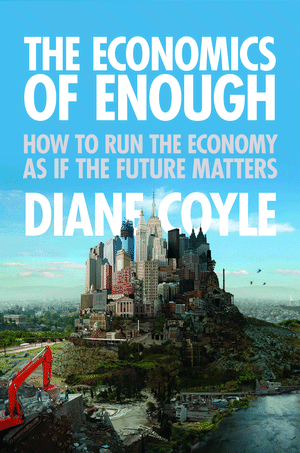The economy faces several kinds of problem, each of which seems depressingly intractable. They include climate change, the government debt and aftermath of the financial crisis, and social inequality for starters. Taking them together, the challenge of devising economic policies can look daunting. So it is not surprising that simple solutions look appealing.
One apparent solution that has been gaining momentum is that the economy needs to give up on growth. That would certainly help in terms of environmental pressures. It is also widely believed that GDP growth doesn’t make us any happier, so why not concentrate on happiness or ‘well-being’ instead?
If only things were so easy. Unfortunately the reasoning is flawed. When ‘happiness’ is measured on a fixed scale, say one to three (and the UK is currently at 2.6 on this scale), and GDP is a constructed indicator that can rise without limit over time, it is statistically naïve to expect to see them linked. Just a bit of thought would show that if GDP growth did not matter, nobody would care about recessions. And there would be no reason to try to end poverty if people can be as happy on low incomes as high ones.
Calling for an end to growth is neither practical politics nor sound ethics. GDP is an important indicator of welfare. The reason it rises is that new goods and services are introduced and people’s choices are extended over time. GDP is a measure of innovation and capabilities, although a flawed one, not a measure of how much stuff we have. So the claim that we can and should move to a no-growth economy is hugely flawed. It is impractical because voters in a democracy would not stand for it, and it is counter-productive in terms of what actually increases people’s well-being.
So, there is no easy zero growth solution to the array of economic problems. The problem of sustainability is going to be much harder to solve. It will require incorporating a much longer-term perspective in the decisions being taken by businesses and policy-makers, because the essence of sustainability is stewardship for the future. Will we leave the next generation at least as well off as we ourselves have been, whether in terms of financial, social or natural wealth? Or have we in fact been living beyond our means by eating into these different forms of capital?
It is clear that the first step towards sustainability will require having the measurements to answer this question. GDP – alongside other indicators of the quality of life and well-being – tells us about our current prosperity. In addition, a comprehensive measure of national wealth is needed each year as an indicator of future prosperity. This concept is in its infancy, but economists have begun to define and calculate it. Including wealth in the conventional economic statistics will make clearer the extent to which we have been living off the future.
A second step to a more sustainable economy will be reforming the institutions governing the economy, whether at the local, national or global level. Some examples of weak ‘governance’ of the economy are notorious. In the case of climate change, for example, not only is it proving impossible to negotiate climate treaties, but existing organisations – the Intergovenmental Panel on Climate Change and the University of East Anglia’s climate research unit – have proven flawed. Improving economic governance is a huge challenge, requiring much greater engagement with the public given the transparency enabled by online technologies. But it is essential because after all ‘institutions’ are the main way decisions and policies are transmitted from one person to another and from one generation to the next. There is overwhelming evidence that the quality of institutions is critically important for the quality of economic policy and outcomes.
The third aspect of a sustainable economy is something economists normally steer clear of, namely ethical values. But it has been a mistake to separate morality from economic questions, as demonstrated by much of the banking industry and some other areas of business in the past few years. This is also a lesson we can draw from the achievements of political and business leaders in earlier eras of great change and uncertainty, of social and political tensions. The Victorian age was just as tumultuous as our own, with the late nineteenth century experiencing its own crisis of capitalism. A shared sense of purpose and a keen awareness of the ethical dimension of the economy were essential for navigating through the turbulence.
A common goal of sustainability, investing enough in the future as well as satisfying the ambitions of today, can provide the necessary navigational guidance, at least as long as we measure adequately what we are doing. However, it is not going to be easy to achieve. A wide spectrum of policy reforms is necessary and even with continuing economic growth; some groups of people will need to make economic sacrifices. Better, though, to face up to the challenges than to imagine they can be avoided.
The Economics of Enough: how to run the economy as if the future matters is published by Princeton University Press

No comments:
Post a Comment